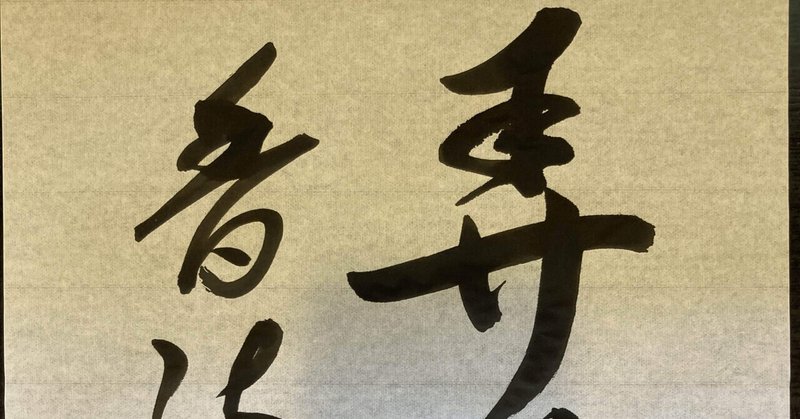
【禅語Zen Words】弄花香満衣(はなをろうすれば こうえにみつ)Play with the flowers and the fragrance will fill your robe
弄花香満衣(はなをろうすれば こうえにみつ)
中国は唐の時代の詩人、于良史の「春山夜月」という美しい詩の一部の、「水を掬すれば月手に在り、花を弄すれば香衣に満つ」という一節が、禅語として知られています。
「春山夜月」という詩は、春の山の素晴らしさを詠んだものと言われています。意訳してみると、春の山を、自然と一体となって楽しむ詩人の姿が浮かんできます。
ーーーー
「春山夜月」:意訳
春の山は素晴らしいことが多く、一つ一つ愛でていると帰るのを忘れてしまいます
思わず水を手ですくうとそこに月が映り、花と戯れていると衣が花の香りで満たされています
心が浮かれるままに身を任せ、草花を愛でてどこまでも行きたい
鐘の音が鳴り南を望むと、鐘楼が草木の芽吹きに包まれてたたずんでいます
ーーーー
さて、このうち「水を掬すれば月手に在り、花を弄すれば香衣に満つ」の部分は、なぜ禅語として捉えられているのでしょうか。
それはこの一節が、「自分と他者という分別を超えた、自他がひとつになった境地」を美しく表現しているものだから、と理解されています。
空に浮かぶ月が、自分の手の中に浮かんでいること。戯れていた花と、自分とが同じ香りを放っていること。
つまり、見る者と見られる者、あるいは主観と客観は、実は一つである、という禅の境地を端的に表現しているからでしょう。
そういう視点で日常を観察してみると、私たちのなにげない日常のなかからも、象徴的な光景を切り取ることができるかもしれません。
楽しみ方の一つとして。
Play with the flowers and the fragrance will fill your robe
A passage from a beautiful Chinese poem entitled 'Spring Mountain and Night Moon' by Yu Laoshi, a poet of the Tang period in China, is known as a Zen word: 'If you scoop up water, the moon will be in your hand; if you play with flowers, the fragrance will fill your robe'.
The Chinese poem 'Spring Mountains, Night and Moon' is said to be a poem about the splendour of the mountains in spring. The translation brings to mind the image of the poet enjoying the mountains in spring, at one with nature.
///
'Spring Mountain Night and Moon': free translation.
There are so many wonderful things about the mountains in spring that I forget to return home when I love them one by one.
When I scoop up a handful of water, I see the moon reflected in it, and when I play with the flowers, my clothes are filled with the fragrance of flowers.
I want to go wherever my heart takes me, loving the flowers and plants.
When the bell rings and I look to the south, the bell tower stands surrounded by buds of grass and trees.
///
Now, why is the part "When I scoop up a handful of water, I see the moon reflected in it, and when I play with the flowers, my clothes are filled with the fragrance of flowers." regarded as Zen words?
It is understood to be because this passage beautifully expresses 'the state where self and others become one, beyond the distinction between self and others'.
The moon in the sky, floating in my own hands. The flower that was playing with me and myself giving off the same fragrance.
In other words, the viewer and the seen, the subjective and the objective, are in fact one, which is a simple expression of the Zen state of mind.
If we observe our daily life from such a perspective, we may be able to capture symbolic scenes from our ordinary daily life.
One way to enjoy it.
この記事が気に入ったらサポートをしてみませんか?
